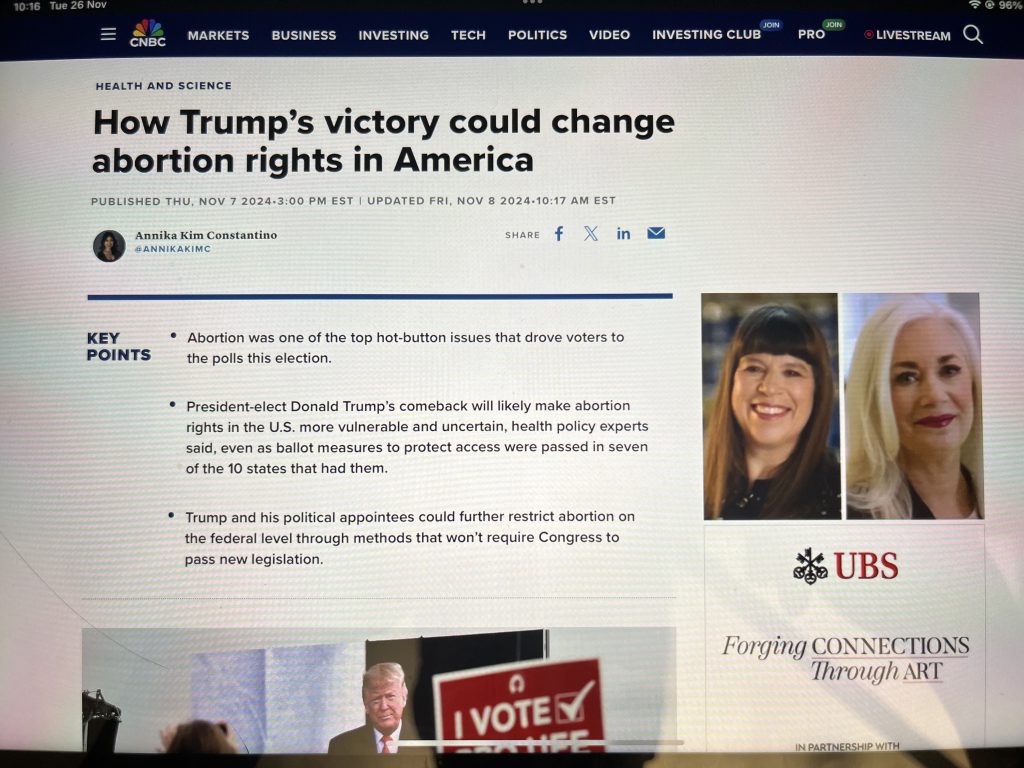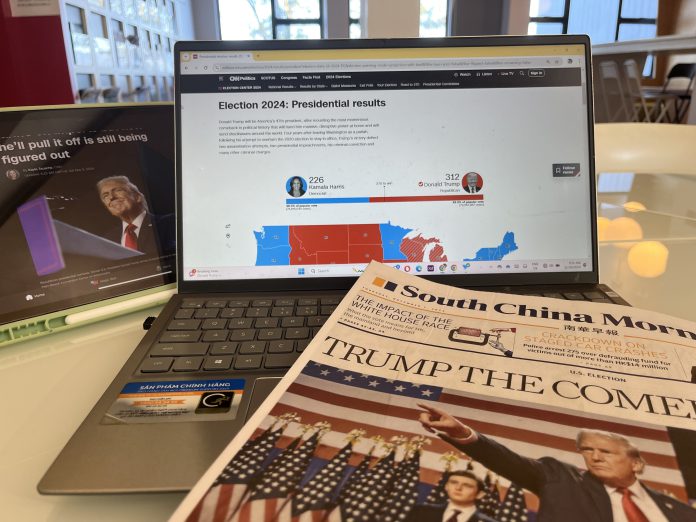Many Americans are worried about Donald Trump’s return to the White House.
By Ken Nguyen
A victory for Donald Trump in the United States (U.S.) presidential election stokes concern about the country’s future economy, healthcare and welfare of immigrants.
“I voted for Kamala Harris, but this result is what I did expect”, says Timothy Esau, an American, who is now a full-time Business student at the Chinese University of Hong Kong.
Esau says that he is worried that the president-elect would likely worsen the U.S. economy with the upcoming tariff policy that targets every country.
Vowing to end inflation in the U.S., Trump, who defeated Democrat Kamala Harris by a significant margin, plans to install a blanket tariff of 10 to 20 per cent on all imports, with additional tariffs of 60 to 100 per cent on goods brought in from China.
“I don’t think tariffs are good for America. The thing is that there are still ways for China to sell their products to the country, which is through a third party,” Esau says.
Aiming at curbing Russia’s Ukraine war efforts, the U.S. imposed individual and economic sanctions. Esau points out Russia manages to sell their products to some companies in Kazakhstan, and from which export to the U.S.
“This way can also help China bypass the tariffs, but of course their products will go up in prices. Even so, expensive Chinese goods will still be more competitive than U.S. goods, and consumers are those who get hurt,” he says.
“So basically, it is tariffs for everybody, especially for the U.S., the one who made the tariffs”, the student adds.
Another American living in Hong Kong, Professor Stacilee Ford from the Department of History, the University of Hong Kong, fears that Trump will limit abortion rights, one of the items discussed in the far-right policy recommendations in Project 2025.
Project 2025 is a comprehensive policy document created by the Heritage Foundation, a prominent right-wing think tank that has influenced Republican administrations since Ronald Reagan.
“It is a document that Trump has tried to distance himself from, but it is pretty clear to be a roadmap of sorts for his second term as the president,” Ford says, adding that she voted for Kamala Harris.
“At one point, Trump was pro-choice (supporting abortion-right), but in his need to be a flag-bearer for conservative voters, he flipped his stance,” she says.
Ford adds that Trump supported judges to the Supreme Court who do want to roll the clock back and ban abortion.

“We will see what he (Donald Trump) does. Note that his wife, Melania Trump, recently wrote in her memoir that she is pro-choice,” she says.
Amaru Ordóñez-Jacobson, an American who is now an exchange student at the Chinese University of Hong Kong, expresses his concern over the healthcare system as Trump calls for sweeping changes to the Affordable Care Act.
“It is incredibly concerning,” he says.
The Affordable Care Act, also known as Obamacare, is a comprehensive health care reform that was signed into law by former president Barack Obama in March, 2010. The reform aims at making healthcare more affordable and accessible for Americans by expanding insurance coverage, reducing healthcare costs, and improving the quality of care.
The student recalls watching a live presidential race debate, in which Trump talked about having ‘concepts of a plan’ to replace Obamacare when being asked how his government would manage to guarantee healthcare for U.S. citizens without the law.
“It was just crazy. How can anyone see a man saying ‘concepts of a plan’ and still think he is the right person to run our country for the next four years,” Jacobson says.
“The fact that Trump wants to remove the policy that has helped tons of Americans better access to healthcare is terrifying,” he adds.
Jacobson shares that he grew up in Texas, where there are many white people showing negative attitudes towards Mexican immigrants.
He worries that the situation will get worse since Trump repeatedly stated in many rallies that he plans for mass deportations of millions of immigrants and expanding the U.S.-Mexico border. Trump claims that this will benefit American workers by raising wages and improving job conditions.
“I am really concerned about how unapologetically racist Trump’s campaign was,” Jacobson says.
Sharing the same concern, Asian American Chloe Yu-Ning Cheng, who is now an exchange student at the Chinese University of Hong Kong, thinks it is worrying that Donald Trump sees deportations as the answer to everything.
“Why are immigrants seen as un-American? This just got me to question what are American values” Cheng says.
The 21-year-old believes Trump only protects and cares about the white and the wealthy. She adds that she does not understand why the president-elect and his team demonises immigrants while talking about preserving ‘American values’ in their rallies.
“According to them, I am not sure if they mean immigrants would change American values, or destroy it, or something. I don’t quite understand what the concern is about,” the student says.
Watching live broadcasting of the election results with her American classmates in a university lecture room, Cheng recalls people were shocked when seeing each of the battleground states being taken by Trump.
“All Americans that I know are processing the result right now. It feels unreal,” says Cheng.
Sub-edited by Iris Jiang







































